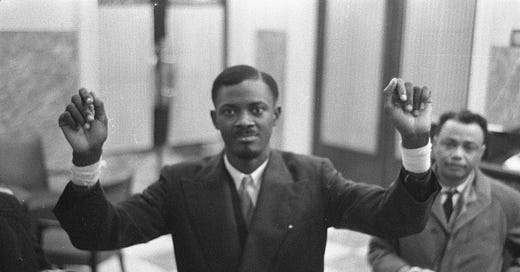This weekend sees the theatrical releases of two movies that prominently feature music while engaging with a country’s legacy of brutality. One gracefully, and the other… not so much.
And happy Halloween! If you’re looking for a mixtape of spooky rock ‘n roll, Liverpool-based DJs Lupini and Kahn have a great one on NTS Radio. It features a Beatles cover titled “I Want to Bite Your Hand.” And at the moment of publication, NTS is streaming a playlist curated by John Carpenter. (Yes, that John Carpenter.)
Soundtrack to a Coup d’État
Playing at Film Forum in NY; expands further in the coming weeks.
Jazz has always been deeply rooted in protest and free expression, with many of its practitioners notable activists. But every art form can be co-opted by larger forces. At the height of the Cold War, the likes of Nina Simone and Dizzy Gillespie were deployed on state-sponsored world tours, a soft power display of American values. “America's secret weapon is a blue note in a minor key,” declared the New York Times. Yet back home, anti-segregation protestors were fighting for their own freedom, an irony that was not lost on those musicians. While most jazz diplomacy was relatively benign, there were times when it was used for far more sinister cover-ups.
In 1960, Louis Armstrong toured the newly independent Democratic Republic of the Congo. Just days after Belgium relinquished its colonial possession, their King supported a coup d’état against the nascent government, which was abetted by a feckless United Nations. The DRC was mired in a civil war, but Armstrong’s visit led to a spontaneous pause in fighting. These performances were later described as a “trojan horse” for the CIA to spur on the eventual assassination of Prime Minister Patrice Lumumba, a freedom fighter who had made the mistake of not being anti-communist enough1. Upon returning home and realizing he had been used, the infuriated singer-trumpeter threatened to renounce his US citizenship.
This underlooked chapter of history, in which anti-communism was pitted against anti-colonialism and jazz played a role in both resisting and perpetuating imperialism, is exhaustively detailed in Soundtrack to a Coup d’État. The film’s director, Johan Grimonprez, rhythmically weaves together contemporaneous news footage, interviews new and old, audio memoirs, and performances by some of the greatest jazz musicians of all time2. All those tunes keep the picture moving at a quick tempo throughout its two and a half hours; UN meetings are much more entertaining when punctuated by John Coltrane. It leads to some fun juxtaposition: during a tour of the United States, Soviet Premier Nikita Khruschev marvels at the splendor of Manhattan and is dismayed when barred from entering Disneyland. Cheekily counterpointing the scene is Louis Armstrong singing “I’m Confessin' (that I Love You).”
The film gets much darker as it digs into the history of the Congo, a region long exploited by Western powers for its natural resources. From copper at the turn of the twentieth century, to uranium during the Atomic Age, to coltan in the Silicon Age, the specters of colonialism and imperialism reverberate to this day. With brief clips of smartphones and electric cars, both of which rely on coltan, Grimonprez and his editor, Rik Chaubet, demonstrate the contemporary echoes of Cold War history without putting too fine a point on it. It’s an extensively researched film; the on-screen citations even list page numbers. Despite the density of information, Soundtrack to a Coup d’État is accessible and timely, essential viewing for those seeking to understand the resonances between artistic protest and state power.
Although the integration of jazz and historical synthesis doesn’t always feel natural, there are moments where they illuminate each other. Abbey Lincoln and Max Roach are among those who storm a meeting of the UN Security Council, in protest of Lumumba’s murder in 1961. Just months before, the two recorded the album We Insist!, which explicitly references the Civil Rights Movement. In a deft act of cross-cutting, the demonstrators are yelling as Lincoln famously screams during a performance of “Triptych (Protest).” Both are cries of anguish in the struggle for unconditional freedom.
★★★½☆
Emilia Pérez
In limited release; streams on Netflix November 13.
The pitch sounds like an AI hallucination: a transgender Mexican drug lord fakes her death, with the help of a frazzled lawyer, so that she can start a new, authentic life. It’s a crime thriller, a romance, and a musical. The film is in Spanish and English, but it is France’s submission for the International Feature Oscar. And Selena Gomez, as the drug lord’s clueless wife, delivers the year’s most giffable line of dialogue. This is an irresistible premise for a movie, so I was disappointed when Emilia Pérez turned out to be a muddled mash of disparate elements, rather than an inspired blend.
When we first meet Rita Mora Castro (Zoe Saldaña), a put-upon trial attorney, she’s writing the closing arguments in defense of a prominent businessman accused of murdering his wife. She knows that he did it, but when her client beats the case, she seems more upset that her male co-counsel delivered the words that let a guilty man walk free. She is swiftly whisked away (kidnapped) and comes face to face with the notorious cartel boss Manitas Del Monte (Karla Sofía Gascón). The narco makes a stunning admission: she has been secretly undergoing hormone treatments and is ready to take the next step in transitioning. Castro is offered two million dollars, plus expenses, to find a discreet doctor to perform gender-affirming surgery. After finding a suitable surgeon, Castro helps Del Monte fake her death and ensures that the soon-to-be-not-deceased’s wife (Selena Gomez) and children have the bank accounts and Swiss passports to live a comfortable life. With everyone’s affairs in order, Castro starts a new, more luxurious life in London. But four years later, she encounters her former client, now named Emilia Pérez, and who wants to live with her children again. Hijinks ensue.
Like any good melodrama, all of that happens within the movie’s first forty minutes. The rest of the overstuffed plot, involving the legacy of cartel violence, fake aunties, and Édgar Ramírez driving a big truck, is best left for you to discover.
This is a good time to mention: much of the plot is advanced by song! The original compositions by Camille and Clément Ducol mostly alternate between kinda-operatic talk-singing and overproduced pop rock reminiscent of the worst songs in Dear Evan Hansen3. Whether it's exposition delivered with a rhythmic rat-a-tat, a Selena Gomez dance number set in a karaoke club4, or a battle of ideals between the lawyer and a doctor who is an absolutely terrible singer, every style of musical is represented, except for the good ones. Of the sixteen songs interspersed throughout Emilia Pérez, the most memorable features a chorus of nurses chanting “chondrolaryngoplasty.”
Even the most lackluster songs can seem thrilling if presented properly (see: The Greatest Showman), but director Jacques Audiard, whom the film’s trailer calls a “renegade auteur,” seems to have initially conceived of Emilia Pérez as a serious, if operatic, drama, only discovering during production the inherent comedy in his ridiculous story. This leads to a weird split between exuberance and exactness that leads to exhaustion. Despite its ambitions missing the mark, this is not an irredeemable picture. Karla Sofía Gascón, as Emilia Pérez herself, handles all the plot twists and turns with grace, and it’s great to see Zoe Saldaña excel in a role where she’s not a mo-cap alien. The movie is glossy and propulsive; it kept me entertained when I saw it at the New York Film Festival earlier this month. But as the credits rolled, I thought to myself, "that was a decent piece of content." And that's about the worst thing I can say about a film made by a renegade auteur.
★★½☆☆
Related Viewing



Although it seems sui generis, there’s a few recent antecedents to Emilia Pérez:
The sleek interior sets of some of the musical sequences recall the striking black box backdrops of Johnnie To’s Office, a neo-corporate musical set during the 2008 financial crisis. Although the operatic numbers, caught somewhere between Brecht and Mao, often fall flat, the set design is super cool.
Emilia Pérez premiered at Cannes this summer, three years after Annette, which is also an original movie musical from an acclaimed French auteur starring A-list Hollywood talents. This movie will be just as divisive as Annette, though I truly enjoyed that bizarre anti-musical. We stan Baby Annette!
And this is not even the first French movie musical set in Mexico! Benjamin Millepied, a dancer and choreographer — and ex-husband of Natalie Portman — directed Carmen, a re-imagining of the classic opera that relocates the action to the US-Mexico border, with Melissa Barrera and Paul Mescal dancing to original compositions by Nicholas Britell. Both Carmen and Emilia Pérez would have benefitted from dispensing with dialogue entirely, and committing to being a full opera.
In December, the Netflix-owned Paris Theater is programming a series titled “Skipped a Beat: 'Emilia Pérez' and Musicals on the Edge.” The repertory selections are just as unconventional as Emilia Pérez, but most of them are much better films. This is a great time to see the likes of The Young Girls of Rochefort, Moulin Rouge!, and La La Land on a big screen.
Blitz
In limited release; streams on Apple TV+ November 22.
Previously reviewed as part of NYFF coverage. The new Steve McQueen picture is solid and subversive, but ultimately too stodgy to transcend convention. Full review here:
NYFF Dispatch 6: Blitzkrieg Flop
Steve McQueen has made some great movies in his career. Shame, Widows, and Lovers Rock are all terrific. 12 Years a Slave won Best Picture at the Oscars. But his newest movie won’t be mentioned in the same breath as those masterworks. It’s not that Blitz is a bad movie, far from it. But despite McQueen’s unique perspective and technical competence, the film is at heart a middlebrow, middle tier British World War II drama. It will probably win a lot of BAFTAs and Oscars.
Also Of Note
There are a lot of movies out this weekend!




Jesse Eisenberg directs the dramedy A Real Pain, which I’ve been hearing good things about. He and Kieran Culkin star as cousins who journey to Poland to honor their late grandmother.
Those interested in “late-style” Hollywood directors can put together a double feature. Robert Zemeckis reunites Forrest Gump stars Tom Hanks and Robin Wright in Here (the original graphic novel is great; the adaptation apparently less so). Clint Eastwood’s Juror #2 has a bafflingly limited release in less than fifty theaters, even though the 94 year old’s film is getting strong reviews; Nicholas Hoult and Toni Collette have an About A Boy reunion.
Godzilla Minus One was one of my favorite movies last year. For whatever reason, it’s getting a re-release this week. Good time to catch up!
NYFF selection No Other Land has gotten nearly universal praise from those who have seen it. The documentary, made in collaboration between Israeli and Palestinian filmmakers, is an unsparing chronicle of the ongoing displacement and violence in the West Bank. Despite the accolades, it remains without a distributor. Wonder why that is… but in the meantime, Film at Lincoln Center is showing it for one week only, partially for awards qualifying purposes. I didn’t get a chance to catch it at the festival, hoping to see it next week.
And while word-of-mouth horror hit The Substance is now streaming on MUBI, you ought to see it in a cinema if you can; it’s still playing in quite a few locations. I loved this movie, others hated it, that’s okay! It’s a body horror version of Promising Young Woman, which I also really liked, but I only saw that movie once, at like midnight, so maybe my opinion would change if I saw it again!
The DRC was subsequently ruled by Joseph-Désiré Mobutu, a virulently corrupt dictator who had the support of the US and Belgium. This recent New Yorker piece from Isaac Chotiner is a good primer on Lumumba’s assassination and Western complicity.
There’s a playlist of this film’s prominently featured music to get you in the mood.
The worst song in Dear Evan Hansen is “You Will Be Found.” It is Broadway terrorism.
This is a hyper-specific pop reference but there’s a scene in which Gomez is sipping whiskey neat and tbh, “It Ain’t Me” is a great theme song for her character.









